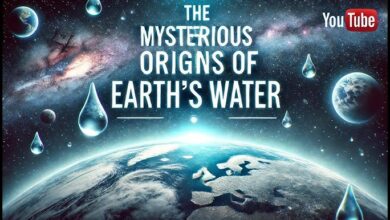What Is Found After The Euphrates River Dried Up SHOCKED Scientists !

The Mystery Beneath the Drying Euphrates River: A Blend of Prophecy, Crisis, and Discovery
The Euphrates River, once a lifeline for civilizations in the Middle East, is drying up. This alarming transformation is more than an environmental crisis—it’s a convergence of history, prophecy, and human impact. With its flow reduced by half in recent decades, the river’s shrinking waters are leaving millions in Iraq and Syria desperate, threatening agriculture, industries, and access to clean water. The ripple effects include potential outbreaks of disease, social unrest, and conflicts over dwindling resources.
Beyond the crisis, the Euphrates has stirred spiritual and cultural intrigue. Biblical prophecy in the Book of Revelation ties the river’s drying to apocalyptic events, while Islamic traditions speak of a “mountain of gold” emerging from its depths, sparking greed and chaos. These interpretations, while symbolic to some, resonate deeply as humanity grapples with climate change, resource depletion, and moral challenges.
The environmental catastrophe has also exposed the Euphrates’ ancient secrets. Recent archaeological discoveries in Turkey reveal hidden carvings and subterranean structures linked to Assyrian gods. These finds hint at a forgotten narrative of cultural fusion and diplomacy from nearly three millennia ago. Meanwhile, historical connections to Babylon’s rise and fall, as well as the biblical exile of the Israelites, add layers of meaning to the river’s modern plight.
What lies ahead for the Euphrates? Experts predict it could dry up entirely by 2040 if current trends continue. As the river recedes, questions arise: What will be uncovered next? Will humanity heed the warnings in time? While some see this as divine judgment, others view it as a call to action—a chance to repair our relationship with nature and rethink our future.

The drying Euphrates is not just a Middle Eastern crisis; it’s a global wake-up call. It challenges us to reflect on the fragility of our ecosystems, the lessons of history, and the role we play in shaping tomorrow. Will we respond with innovation and compassion, or let greed and inaction lead us toward disaster? The answer may shape not just the fate of the Euphrates but our own as well.
The Euphrates River, brimming with life-giving water alongside the Tigris and Jordan Rivers, formed the Fertile Crescent—an oasis of abundance and the birthplace of civilization in the Middle East. However, this historic river now faces a troubling decline in water levels. The Tigris and Euphrates are also tied to the enigmatic Hanging Gardens of Babylon, a legendary wonder often linked to Persian culture. Although its existence remains uncertain, its symbolic presence in prophecy deepens its mystique.
Babylon, once a thriving city, is portrayed in the Book of Revelation as a fallen woman riding a fearsome red dragon with seven heads and ten horns. This dragon, after devouring her, engages in a cosmic battle with a savior who, like a sacrificial lamb, offers himself for humanity’s salvation. The apocalypse unfolds as angels sound their trumpets, culminating in the ultimate triumph of good over evil. The drying of the Euphrates River has sparked apocalyptic discussions, particularly due to its prominent role in biblical prophecy. In the Book of Revelation, the river’s drying unveils ancient ruins and a mysterious cave, which some interpret as a sign of the end times.

Two key biblical passages predict this event. The first is found in Jeremiah 50:38, part of a prophecy against Babylon, where God foretells a drought that will dry up its waters—a reference to the Euphrates and Tigris Rivers. With both rivers experiencing reduced water levels today, some wonder if Jeremiah’s prophecy is unfolding before our eyes. The second prophecy appears in Revelation, during the seven bowl judgments marking the end of the seven-year tribulation. These catastrophic events include the drying of the Euphrates, an event so devastating it could threaten all human life if prolonged. However, God shortens this period for the sake of the chosen.
While the current state of the Euphrates raises questions, it does not align with Revelation 16:12, where the river’s drying occurs near the tribulation’s end—after the rise of the Antichrist, the ministry of two prophets, and numerous other judgments. Additionally, Revelation 18 implies that Babylon will still engage in thriving maritime trade during the tribulation, suggesting the rivers will remain navigable. The prophecy also mentions a specific army from the East threatening Israel, which is not the case today.
Ultimately, the current drying of the Euphrates does not fulfill the prophecy of Revelation 16:12. That event remains a future occurrence, signaling the approach of the battle of Armageddon. While the reasons behind the river’s decline may vary, the prophecy will inevitably be fulfilled, reaffirming the unwavering truth of God’s word.
The receding waters of the Euphrates—a lifeline for millions and the cradle of ancient civilizations—have ignited end-times discussions due to their prophetic significance in the Book of Revelation. Across the world, events such as famines, earthquakes, disasters, wars, and even the drying of rivers are interpreted by some as signs of the end times. But how should Christians respond if these truly are the last days?
The Apostle Peter provides clear guidance. He writes that when the heavens pass away with a great noise and the earth is burned up, believers should not retreat or hoard supplies. Instead, he urges them to live in holiness, godliness, and active service. Christians are called to do good wherever and whenever possible. Paul echoes this sentiment in his letter to the Galatians, encouraging believers to do good to all, especially to those of the household of faith.
Jesus’ teaching to “do unto others as you would have them do unto you” challenges believers to go beyond refraining from harm and actively love their neighbors with kindness, generosity, and patience. While many in today’s world disregard God’s teachings, all will ultimately stand before their Creator on Judgment Day, equal in value regardless of their earthly status.
There is an inherent connection between existence and dependence. Every created being relies on something greater for its existence. This dependence points to the simplicity and sovereignty of God, who imparts existence to all things. As believers, we must observe, listen, and follow God’s word to be saved in the last days.
Brothers and sisters, my heart aches for those who have not yet experienced the warmth of God’s embrace. Though the world may seem dark, dawn always follows the night. Jesus is near, ready to dispel the shadows with his light. Signs of his coming are everywhere, unfolding rapidly. John’s Revelation provides a glimpse into the future, painting a vivid picture of what is to come. While the causes may remain a mystery, the truth of these events is undeniable.
As believers, we must not dwell in sorrow. Instead, let joy fill our hearts, for we are destined for a heavenly home. Our journey is nearing its end, and what awaits us is beyond imagination. Lift your eyes, dear friends, and let hope fill your souls. The time is near, and our homecoming is at hand. Rejoice, for the best is yet to come.








